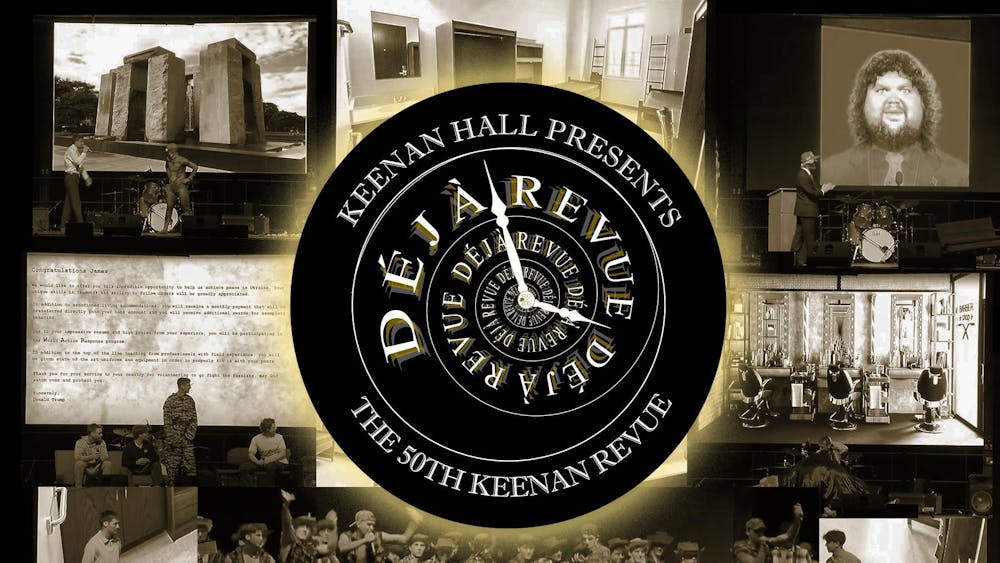Actors From the London Stage (AFTLS) performed Shakespeare’s tragedy of “Macbeth” at Washington Hall on Oct. 5, 6 and 7. During his life, Shakespeare knew the actors he was writing for and collaborated with them on the play’s performances. While actors cannot directly collaborate with Shakespeare anymore, AFTLS still aims to work with him.
The fascinating part about watching AFTLS is seeing the five-cast company take on multiple roles. Portraying a multi-faceted Shakespearean character is an accomplishment, and AFTLS actors
portray multiple roles. The production of “Macbeth” gave me a deeper appreciation of the art form this company is seeking to accomplish.
They imagine the reality of the theater Shakespeare performed in
and bring this to light. Their creative liberties are chosen for distinct reasons. In “Macbeth,” these creative liberties provided a contrast to the storyline. “Macbeth” is not solely the tragedy of a power-hungry man who chooses to commit murder to fulfill the three witches’ prophesy. It has comedic moments and actors who wish to interact with the audience.
Each of the cast members mastered the subjects they were playing. Roger May as Macbeth brought about the hesitation Macbeth felt about killing King Duncan and later, the shift of Macbeth into the tyrant.
Several moments throughout the play were comedic and part of this relates to the structure of AFTLS. In order to differentiate the cast members, AFTLS uses props to reflect which character the actor is portraying. In the scene where Lady Macduff (Anne Odeke) is murdered, one of the murderers is also played by Odeke. Annabelle Terry, who plays Lady Macduff’s son, holds up the cloth that is Lady Macbeth’s distinguishing prop. The scene of the two murderers fighting and killing a cloth was highly humorous, especially amid a tragic scene. Additionally, the scene with the drunk porter (Annabelle Terry) incorporated the use of props, enhancing the humor of the scene. In this scene, Terry also interacted with an audience member. In Shakespeare’s time, the audience and the actors had a relationship in some ways. Terry appeared in both “Much Ado About Nothing” in January and the “Macbeth” production in October. Terry’s acting as Banquo was exceptionally well done, especially when Banquo is a ghost.
The shift of Macbeth is brought about through Lady Macbeth (Claire Redcliffe). Redcliffe and May’s performance showed audience members the love between the two. The way May expressed Macbeth’s heartbreak over losing Lady Macbeth caused
emotions to come rushing through the audience. Lady Macbeth’s original girl boss, gatekeep and gaslight persona was brought out in her scenes. Redcliffe showcased this aspect of her character and the emotional fragility she feels at the end. Portraying the complicated Lady Macbeth was one of many roles Redcliffe played. Redcliffe also played Donalbain, Ross, Fleance, Second Witch, Young Siward
and Messenger. Playing Lady Macbeth and one of the witches is a powerful combination. Through their actions, the witches and Lady Macbeth spur the tragedy in this play.
Treason is what causes Macbeth to gain the title of “Thane of Cawdor” and to lose the title of King. It is treason that gives Macbeth power, but treason that takes it away. Macduff (Michael Wagg), the man who is not borne of woman, stops the tyrant. The actors brought Shakespeare’s pages to light in the way it was meant to be performed.
Play: “Macbeth”
Starring: Roger May, Anne Odeke, Claire Redcliffe, Annabelle Terry, Michael Wagg
Produced by: Actors from The London Stage
Shamrocks: 4.5 out of 5
Contact Rose at randrowich01@saintmarys.edu.
Editor's note: A previous version of this reviewmisidentified Kenneth Branaghas part of the AFTLS cast. The Observer regrets this error.









